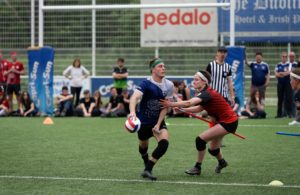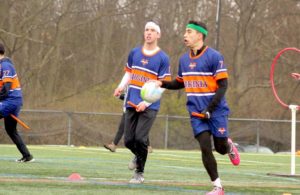- Rule, Britannia, no more?
- Unpopular Opinions: US Quadball Cup 2023
- Proven Contenders: University of Virginia
- Proven Contenders: Rutgers University
- Proven Contenders: University of Michigan
- Proven Contenders: Creighton University
- Different Perspectives: A Look Inside USA Ultimate
- Antwerp QC, Much of Belgian Core, Leaves Competitive Quidditch
Will They or Won’t They: Texas Cavalry, No. 1 Club
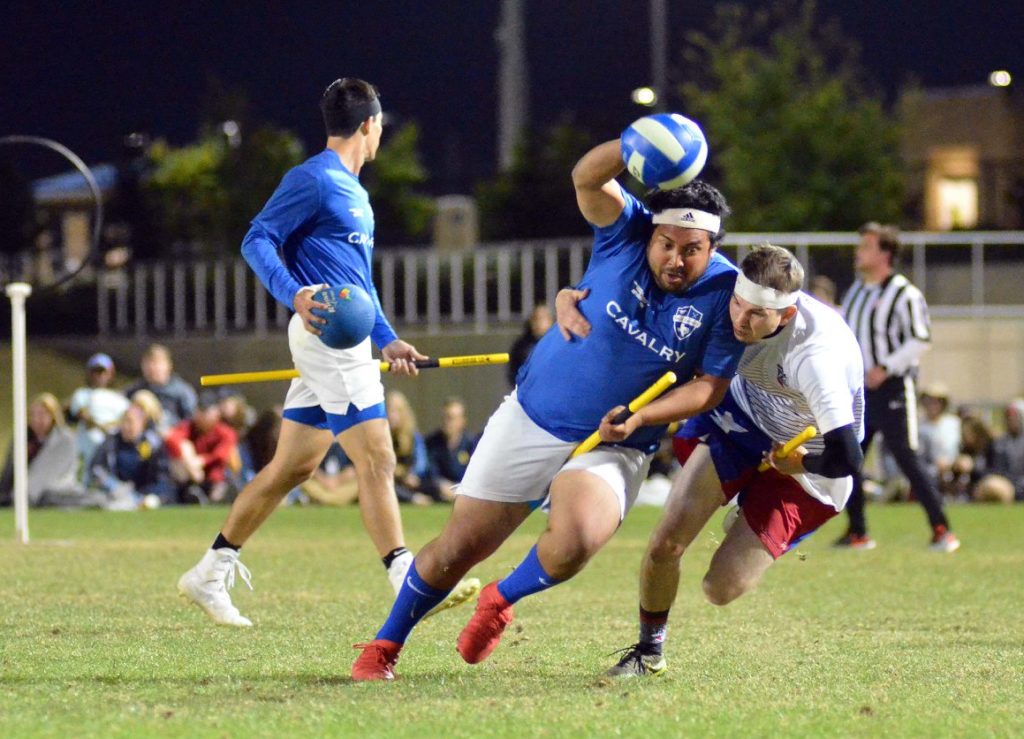
Credit: Katie Stewart
In addition to our preseason rankings, The Eighth Man staff will be releasing a series of articles focusing on the top 10 club teams and top 10 collegiate teams. Each article will be written by two members of the staff, one who believes the team will live up to or exceed expectations and one who thinks they will come up short.

It’s Still Monroe’s Year
By Raghuveer Achukola, Correspondent
Has there ever been an answer to a full-strength Texas Cavalry team? With all the talent in the Southwest, all the physicality of their USNT chasers and a future hall-of-famer captain—it is no wonder at all that Cavalry is the most dominant quidditch team in the modern era, winning a league-leading 88.2 percent of their games through all seasons of existence.
This team is the only team in USQ that flaunts six former USNT players: Augustine Monroe, Marty Bermudez, Kaci Erwin, Cole Travis, Joshua Andrews and Kenny Chilton. To rub salt in the wound, not only did these players all play together last season, but–with the exception of Chilton–they all played together on the 2018 USNT as well as the Austin Outlaws this summer. Cavalry returns perhaps the most skilled and most well-coordinated line in all of quidditch.
As if that weren’t enough, graduation has hit the Texas colleges hard; UTSA, Texas State University and University of Texas graduated a significant crop of players. While new club team Texas Hill Country Heat will take a sizable portion of these players, the Heat–at time of press–are not taking any players away from Cavalry. Heat will draw some players in from Lone Star Q.C.–either due to familiarity with captain Jackson Johnson or from exasperation with Lone Star’s fifth failed attempt to take the title–but Cavalry’s core remains steadfast and optimistic.
And why shouldn’t they be? Lone Star might have been a significant rival in the regular season, but for the last two years there has been no doubt about which team wins in April.
Detractors have a few salient points. Unlike Cavalry’s win in 2017, their most recent title came with a few stumbling blocks in the form of in-range games against both Q.C. Boston and the Bosnyan Bearsharks, with Q.C. Boston even holding a 30-point lead at one juncture in the game. But this is nitpicking. The Bosnyan game was barely in range with Cavalry leading 60-30 before Cavalry caught the snitch, and while Q.C. Boston had the most impressive performance of any club team against Cavalry at nationals, Cavalry still won that game.
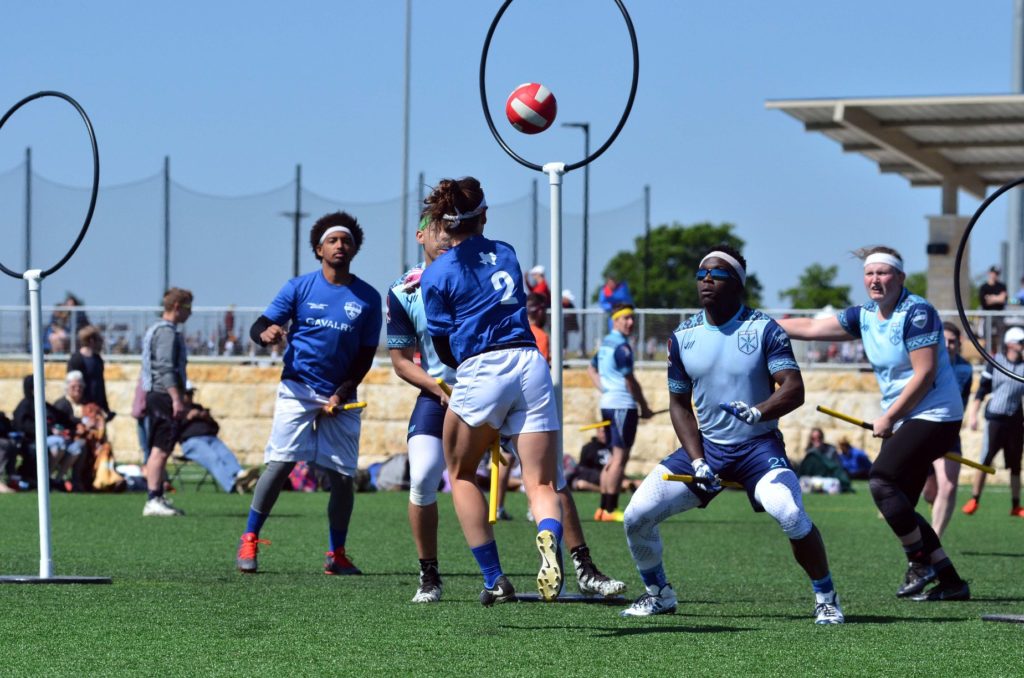
Credit: Katie Stewart
Cavalry’s success is mainly due to the snitch-on-pitch beating of Travis and Monroe combined with the seeking of Andrews and Chilton, all USNT players. Neither of Cavalry’s beaters have the technical skill of any of their USNT counterparts–Johnson, Max Havlin or Tyler Walker, all of whom play for other clubs–but it doesn’t matter. With their speed, Cole and Monroe can outplay them all during snitch on pitch. Additionally, Cavalry’s quaffle game does not suffer, even when they switch to a two-male beater set. Erwin is the best non-male defensive chaser in quidditch, which–combined with the tackling ability of chasers like Bermudez or the driving and elusiveness of chasers like Tyrell Williams–has ensured that Cavalry’s starting line has never been taken out-of-range this past year…
… except for once. The only suspicion of any team weakness rises when you look at the athletes’ 2018 USNT performance against Australia. The USNT line consisting of all rostered Cavalry players–save Texas beater Hallie Pace–was taken out of range and found themselves down 40-0in the first game against Australia and then struggled to put up any points in the second Australian match. The Dropbears, in essence, gave a blueprint on how to beat Cavalry and every club team is sure to study it. While articles have already been written as to what Australia was doing during that game, an even more concise version can be written as follows:
1) On offense, force zero-bludger situations and draw the entire defense before opening up the shot or pass.
2) On defense, simultaneously stop the shot ,pass and the drive with good positioning and physical play.
The problem with both of these tactics is that they played to Australia’s unique strength. There is no player in the entirety of the United States that plays like Australian keeper Callum Mayling. The USNT chasers were physically outmatched by the average Australian chaser and especially by Mayling who showed a virtual immunity to the double team, while being able to tackle the U.S.’s best drivers singlehandedly while blocking lanes. Sure, there is a lot to be learned from Australia’s success. But lacking the physicality of Mayling, Dameon Osborn, Andrew Culf or any of the other Australian chasers, it is doubtful that any team would be able to execute the plan to perfection like Australia did.
And, even if they did, captain Monroe has shown an incredible talent to make the necessary adjustments to take his team to the championship in every division—college, club and MLQ. A natural leader on and off the pitch, Monroe’s guidance has resulted in five USQ titles for the teams he has played on.
The most damning pattern? Monroe’s four nationals results for the Longhorns, in chronological order: Sweet 16, Champion, Champion, Champion.
Monroe has had three nationals appearances for Texas Cavalry: Sweet 16, Champion, Champion.
Move over, club teams. It is still Monroe’s year.

The End of an Era
By Jackson Johnson, Correspondent
Texas Cavalry is entering the 2018-19 season as virtually the same squad as last season.
The Texas club team will return their entire core, save for Simón Arends. But the squad seems to have several options—such as Aryan Ghoddossy, Rajan Makanji or Tyrell Williams—to fill Arends’ role within the team and with the addition of Mollie Lensing, Cavalry looks to come out as strong as last season. With little turnover, and another year under their belt, many are expecting Cavalry will win USQ Cup once again. However, any club team doing their due diligence will look back on the Cavalry of 2017-18 and see the team isn’t as untouchable as they may seem.
Last season, Cavalry pretty consistently traded wins with Lone Star Q.C. during each meet and at Cup, both the Bosnyan Bearsharks and Q.C. Boston held Cavalry in range for varying intervals. On top of those two close matchups, the finals of USQ Cup was also anyone’s game. With, arguably, the most fortunate false start penalty ever seen in the sport and a poorly-timed yellow card during snitch-on-pitch, Cavalry was able to kill Lone Star’s momentum early on and faced no contest against two beaters for during snitch on pitch. But Cavalry is still a vulnerable team, as proven by those USQ Cup games that were dictated by varying strokes of luck.
It’s no secret that Cavalry isn’t necessarily the deepest team out there. They are heavily dependent on starters Augustine Monroe, Kaci Erwin, Marty Bermudez and Cole Travis and seem to only entrust a select few others when it comes to big games. If teams can wear down Cavalry’s top line, they will force the squad to decide to either trust in others or play tired. Either choice can become problematic on day two of tournaments. Come nationals, if Cavalry gets stuck in a long game or two, their level of play could significantly decrease as the weekend goes on, leaving them more susceptible to being knocked out by a deeper team.
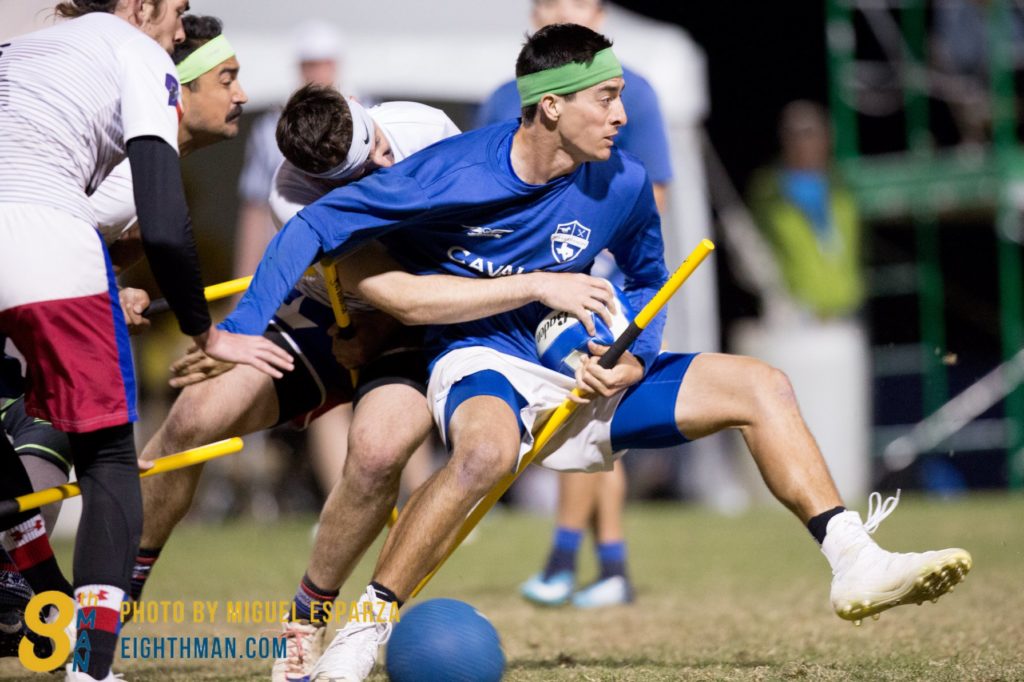
This is not to downplay Cavalry’s strategies or the team’s ability to do what they need to in order to win. They have shown to be the best in the world at adapting and enduring, and they deserve the success that’s come from it. But with their success, Cavalry has also better-equipped their opponents to beat them. Teams are learning from their mistakes and are cooking up more strategies and ideas that can be used to beat the Texas club team. They’ll look to other team’s effective strategies, such as Australia’s defense against the Cavalry-heavy USNT. If USQ club teams can effectively learn and implement the Australian defensive strategy used against the Cavalry USNT line this summer, we will likely see a new champion come April. Whether it is possible for the club teams to run an effective Australian-style defense is something we will just have to wait and see.
Whatever may happen this season, it will be interesting to watch what teams come up with to try and knock off the defending champions. With a larger target on their backs than ever and a possible weakness exposed, it’s feasible that Monroe’s year has come to an end.

